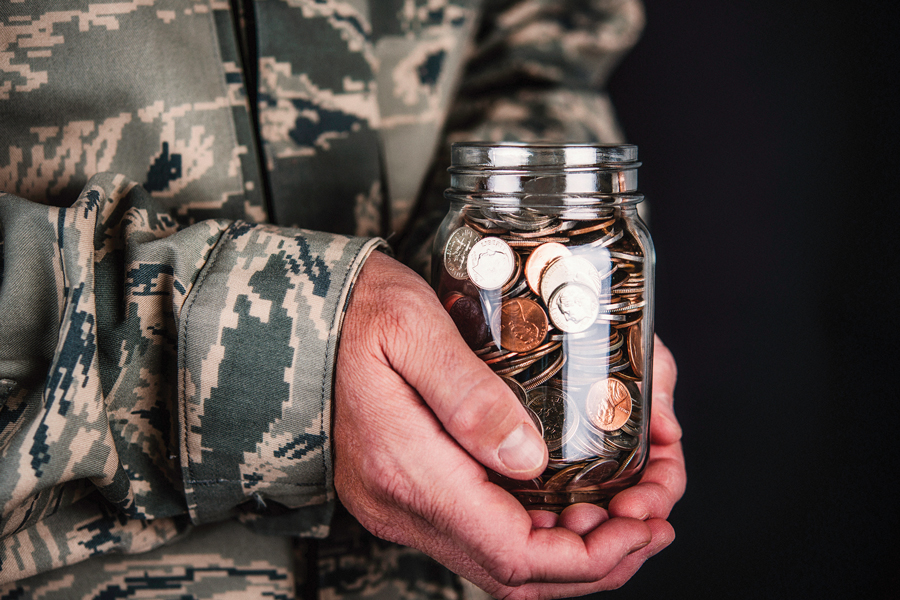

With Memorial Day drawing near, a new study is spotlighting a less visible hardship for many US veterans: debt.
According to research from National Debt Relief and Wakefield Research, an overwhelming 91% of veterans believe financial obligations can intensify symptoms of post-traumatic stress disorder.
The findings suggest that for some, the financial transition to civilian life may carry burdens as serious as those faced during military service.
Surveying 1,000 veterans aged 21 and older, the report highlights the emotional and financial toll that unsecured debt is taking, especially on younger veterans. More than one-third of Gen Z and Millennial respondents said their debt has directly worsened their PTSD symptoms.
"For many veterans, debt has become another battle to fight," Natalia Brown, chief compliance and consumer affairs officer at National Debt Relief, said in a statement unveiling the findings.
"When savings are low and debt tops $10,000 or more, even small setbacks can become overwhelming, especially when already carrying the invisible wounds of service," Brown said.
The majority of veterans – nine in ten – report holding some form of debt. Nearly three-quarters carry credit card balances, and among those, one in three owe at least $10,000.
Medical bills are also a persistent issue, with 30% of all veterans and 44% of Gen Z and Millennial veterans citing healthcare costs as a source of current debt.
The financial picture is further strained by the lack of emergency savings. Nearly one-quarter of respondents are standing on the brink, reporting that they have no money set aside whatsoever.
Meanwhile, job insecurity and broader economic uncertainty are driving widespread anxiety. Seventy-eight percent of veterans are concerned about their employment or financial stability, a concern that spikes to 86% for younger generations.
The stress isn’t only emotional. The report notes that 54% of indebted Gen Z and Millennial veterans have worked longer hours than they’d prefer to stay afloat, while one-third have skipped meals to make ends meet.
Some also struggle to secure employment quickly after leaving the military – 43% needed six months or more to find work, and 28% admitted to lacking financial literacy during the critical early months of civilian life.
"I've walked this road – both my wife and I served, and we know what it's like to face financial uncertainty after active duty," said Phillip Easton, managing director at the American College of Financial Services' Center for Military and Veterans Affairs.
Easton highlighted how the silent financial battles so many veterans are fighting – living paycheck to paycheck and struggling to build a career after service, among others – eats away at their sense of dignity.
"Financial instability can take a toll on a veteran's confidence and sense of worth," he said. "Financial literacy and support to build financial health must be recognized as core pillars of a successful transition, not afterthoughts once the uniform comes off."

Rajesh Markan earlier this year pleaded guilty to one count of criminal fraud related to his sale of fake investments to 10 clients totaling $2.9 million.

From building trust to steering through emotions and responding to client challenges, new advisors need human skills to shape the future of the advice industry.

"The outcome is correct, but it's disappointing that FINRA had ample opportunity to investigate the merits of clients' allegations in these claims, including the testimony in the three investor arbitrations with hearings," Jeff Erez, a plaintiff's attorney representing a large portion of the Stifel clients, said.

Chair also praised the passage of stablecoin legislation this week.

Maridea Wealth Management's deal in Chicago, Illinois is its first after securing a strategic investment in April.
Orion's Tom Wilson on delivering coordinated, high-touch service in a world where returns alone no longer set you apart.
Barely a decade old, registered index-linked annuities have quickly surged in popularity, thanks to their unique blend of protection and growth potential—an appealing option for investors looking to chart a steadier course through today's choppy market waters, says Myles Lambert, Brighthouse Financial.
